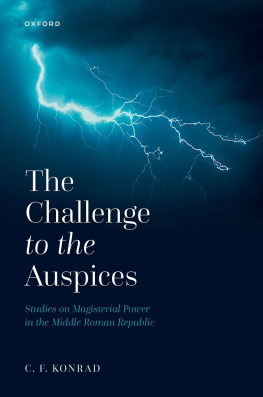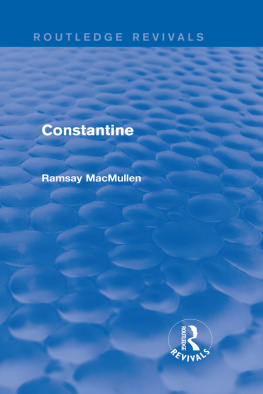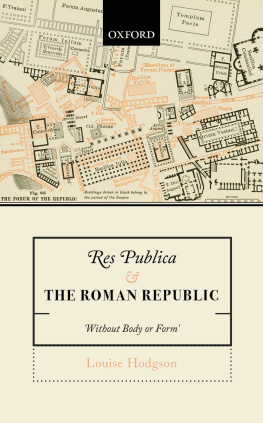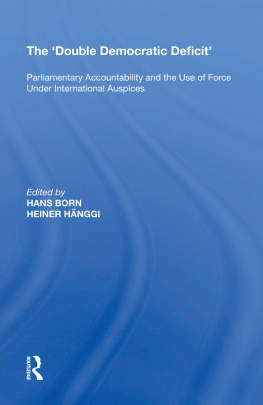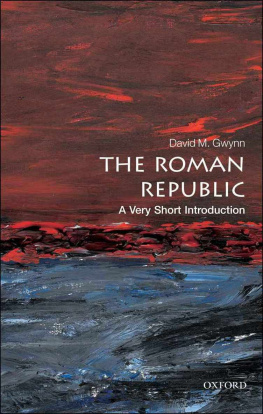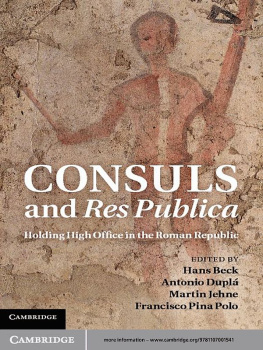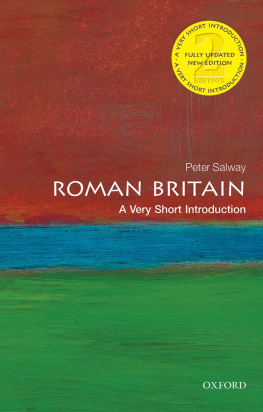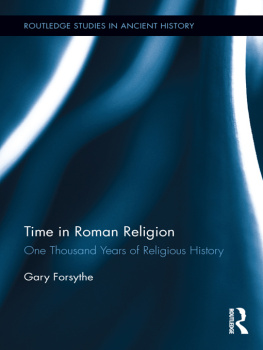Oxford University Press is a department of the University of Oxford. It furthers the Universitys objective of excellence in research, scholarship, and education by publishing worldwide. Oxford is a registered trade mark of Oxford University Press in the UK and in certain other countries
C. F. Konrad 2022
All rights reserved. No part of this publication may be reproduced, stored in a retrieval system, or transmitted, in any form or by any means, without the prior permission in writing of Oxford University Press, or as expressly permitted by law, by licence or under terms agreed with the appropriate reprographics rights organization. Enquiries concerning reproduction outside the scope of the above should be sent to the Rights Department, Oxford University Press, at the address above
You must not circulate this work in any other form and you must impose this same condition on any acquirer
Links to third party websites are provided by Oxford in good faith and for information only. Oxford disclaims any responsibility for the materials contained in any third party website referenced in this work.
Preface
No public action of the Roman State, the populus Romanus, at home or at war, was to be carried out without prior permission from Iuppiter Optimus Maximus: permission obtained, through auspices, by the magistrate (usually a Consul, Praetor, Censor, or Dictator) in charge of the intended action. It was for the individual magistrate to take the auspices, and either proceed with the action orshould Iuppiter withhold permissionrefrain from it; but if a question arose as to the correct meaning of the gods answer or message, a greater degree of expertise was called for. It was furnished by the Augurs, nine expertsand usually senatorswho could advise a magistrate individually, or as a body submit a formal interpretation to the Senate, who would issue the necessary directives to comply with whatever augural law required.
Auspices thus occupy a fundamental place in theunwrittenconstitution of the Roman State. They are an instrument of Roman government; they are also part of Roman religion. The study of the latter has undergone wide-ranging changes over the past generation or two. In the context of this book, the most significantand salutarydevelopment has been the abandonment, by and large, of a view that saw little more than empty ritual in Roman religious practices as a whole, and mostly cynical manipulation for political purposes in the practice of augury in particular.
This book examines, in a collection of related studies, a range of situations in which auspices led to questions about the legitimacy of a magistrates action or status, and became a matter of political contention. It is primarily concerned with the institutions affected by those events: an attempt to understand, as precisely as possible (and readers will be keenly aware of just how difficult it is to extract reliable information from the evidence that has survived), their functioning, their rules, their practices. It has little to offer in the way of theoretical discussion; although, to some extent, my views on the larger questions that surround the role of augury in Roman religion and government may become clear from my treatment of individual issues. In general terms, I proceed from an assumption that the Romans, high and low alike, took their gods to be real, and took them seriously.
The gods to be taken seriously included, first and foremost, Iuppiter Best and Greatest, the god of auspices. As a whole, the Roman ruling classthe Noblesat least during the period of the Middle Republic, the third and second centuries bc , appears to have embraced and observed the rules imposed by augural law scrupulously and without contention; it would be difficult to argue with Craige Champions recent conclusion that Roman elites believed in their gods, in the sense that they held a collective conviction that proper observance of orthopraxys demands had a direct bearing on the well-being of the empire. Without doubt, this puts the matter accuratelyas a whole. But any society has its doubters and unbelievers, professed or covert; and individuals do not always act in accordance with collective conviction.
The book takes its origin from a curious entry in the Fasti Capitolini, which under the year 217 bc list the second dictatorship of Q. Fabius Maximus Verrucosus as having been interregni caussa, for reason of an interregnum. No connection seems conceivable between the Dictator and an interregnum, the situation that obtained when, for one reason or another, no regular magistrates were in office, and the auspices reverted collectively to the patres, the patrician members of the Senate (or perhaps all Patricians). A caretakerthe Interrexchosen auspicato by the patres for five days at a time managed the res publica until he could successfully conduct the election of new Consuls; in this way, since no auspices carried over from the magistrates of the previous year to those newly elected, the auspices were renewed de integro. The strange appellation interregni causa, occasionally noted by scholars but rarely discussed, called for explanation; and the explanation prompted two distinctalbeit relatedfurther avenues of investigation.
In 223 bc the College of Augurs concluded that the Consuls of that year were vitio creati, elected under flawed auspices, and the Senate duly instructed them to abdicate their office, in order for the auspices to be renewed in untainted form through the process of an interregnum. But one of the Consuls, Gaius Flaminius, balked at the order, and openly disputed the Augurs ruling. He refused to abdicate, at least at first; eventually, though, he yielded, and the desired interregnum ensued. What made him step down? The circumstances may have required a magistrate with greater powera Dictator, for reason of an interregnum.
The attempt to solve the puzzle made it necessary to re-examine the nature of the dictatorship and the role of imperium and auspices as markers of legitimate power for Roman magistrates. But this remarkable instance of a Consul publicly challenging a ruling by the College of Augurs also led to a second line of inquiry, one that gave this book its title: an investigation into a series of attemptsmostly in the third century bc by leading actors in the res publica to question the traditional role of auspices in the proper conduct of warfare.
For Flaminius in 223 was not the first Roman magistrate who refused to submit to the rules that represented the augural side of the republican constitution, nor the last. During the lifetime of one generation in the third century, a number of instances are known in which senior Roman magistrates chose to contest the rule of auspices and the authority of the Augurs. One case is reported even earlier, in the fourth century; two more in 249 bc ; another in 242 or 241; and in 217, Flaminius in his second consulship again made a point of ignoring the auspices. All those instances are well known, but merely seen as isolated incidents. The present study aims to understand them as expressions of a larger sense of disaffection among elements of the Roman political class. Observing auspices according to all the augural rules could restrict, sometimes severely, a military commanders freedom of action in the field. To encounter five attempts, in a span of just over thirty years (between 249 and 217), at challenging the practice suggests the presence of a set of mind that did not subscribe to the inescapable necessity of obtaining Iuppiters permission, through auspices, for all public acts; and some of those in a position to launch a challenge chose to seize the opportunity. Had any of them prevailed, more might have been encouraged to follow; and each time a military operation was conducted successfully without the proper observance of augural rules, upholding and enforcing such rules in future would have become ever more difficult. If auspices could be shown to be unnecessary in the sphere of war, moreover, their efficacy in the realm of domestic government could be called into question as well.

